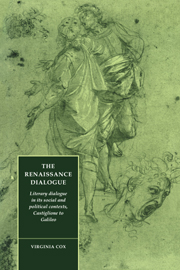 The Renaissance Dialogue
The Renaissance Dialogue Published online by Cambridge University Press: 05 December 2011
Richiedon leggitore introdotto bene, attento, assentito e valoroso, che ne sappia cavar que' tesori che vi son quasimente affogati nel dialogo, ed in una maniera di trattarli anzi stravagante, che no.
Orazio Lombardelli, I fonti toscani (1581)This observation of Orazio Lombardelli's on Pietro Bembo's Prose della volgar lingua (1525), can tell us a great deal about the reasons for the decline of dialogue in late-Cinquecento Italy. In particular, stemming as it does from formal and methodological considerations, it provides a useful corrective to any temptation to interpret this phenomenon simply as a result of the cultural policies of the Counter-Reformation. The glamour of the explanation considered in the previous chapter – the cultural reverberations of censorship – should not blind us to the many less dramatic factors in the culture of the age which may have an equal weight in determining developments in the dialogue. After all, whatever Lombardelli is objecting to in Bembo's Prose, it is certainly not their capacity to act as a covert channel for the expression of what Sforza Pallavicino might term ‘empia credenza’ or ‘viziosa cupidità’.
It is important to stress that Lombardelli's critique of the dialogue is not referred to a work like Castiglione's Cortegiano, which makes a genuine attempt to represent a plurality of voices. The Prose della volgar lingua are – especially after the first book – indisputably monological in character: indeed, they would be cited by Pallavicino as one of the supreme examples of the ‘maniera insegnativa perfetta’ in dialogue, precisely because of the clarity with which they reveal ‘l'opinione dello Scrittore’.
To save this book to your Kindle, first ensure [email protected] is added to your Approved Personal Document E-mail List under your Personal Document Settings on the Manage Your Content and Devices page of your Amazon account. Then enter the ‘name’ part of your Kindle email address below. Find out more about saving to your Kindle.
Note you can select to save to either the @free.kindle.com or @kindle.com variations. ‘@free.kindle.com’ emails are free but can only be saved to your device when it is connected to wi-fi. ‘@kindle.com’ emails can be delivered even when you are not connected to wi-fi, but note that service fees apply.
Find out more about the Kindle Personal Document Service.
To save content items to your account, please confirm that you agree to abide by our usage policies. If this is the first time you use this feature, you will be asked to authorise Cambridge Core to connect with your account. Find out more about saving content to Dropbox.
To save content items to your account, please confirm that you agree to abide by our usage policies. If this is the first time you use this feature, you will be asked to authorise Cambridge Core to connect with your account. Find out more about saving content to Google Drive.